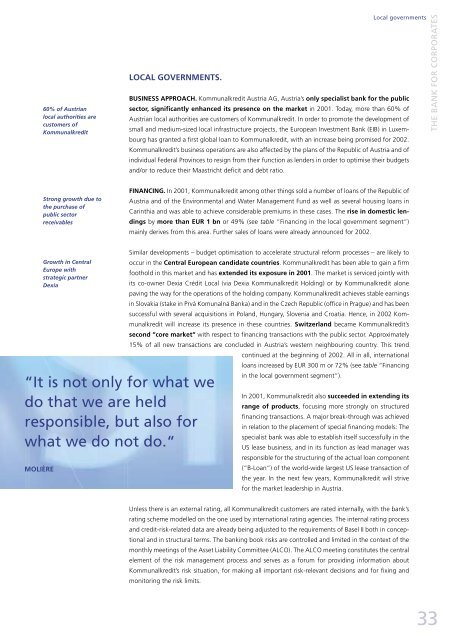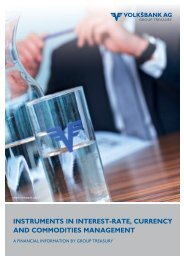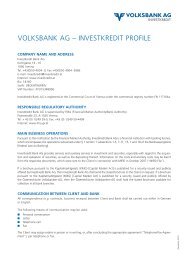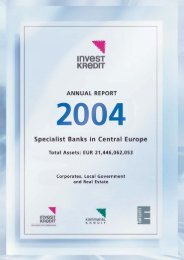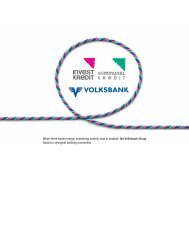Download - Volksbank AG
Download - Volksbank AG
Download - Volksbank AG
You also want an ePaper? Increase the reach of your titles
YUMPU automatically turns print PDFs into web optimized ePapers that Google loves.
60% of Austrian<br />
local authorities are<br />
customers of<br />
Kommunalkredit<br />
Strong growth due to<br />
the purchase of<br />
public sector<br />
receivables<br />
Growth in Central<br />
Europe with<br />
strategic partner<br />
Dexia<br />
“It is not only for what we<br />
do that we are held<br />
responsible, but also for<br />
what we do not do.“<br />
MOLIÈRE<br />
LOCAL GOVERNMENTS.<br />
Local governments<br />
BUSINESS APPROACH. Kommunalkredit Austria <strong>AG</strong>, Austria’s only specialist bank for the public<br />
sector, significantly enhanced its presence on the market in 2001. Today, more than 60% of<br />
Austrian local authorities are customers of Kommunalkredit. In order to promote the development of<br />
small and medium-sized local infrastructure projects, the European Investment Bank (EIB) in Luxembourg<br />
has granted a first global loan to Kommunalkredit, with an increase being promised for 2002.<br />
Kommunalkredit’s business operations are also affected by the plans of the Republic of Austria and of<br />
individual Federal Provinces to resign from their function as lenders in order to optimise their budgets<br />
and/or to reduce their Maastricht deficit and debt ratio.<br />
FINANCING. In 2001, Kommunalkredit among other things sold a number of loans of the Republic of<br />
Austria and of the Environmental and Water Management Fund as well as several housing loans in<br />
Carinthia and was able to achieve considerable premiums in these cases. The rise in domestic lendings<br />
by more than EUR 1 bn or 49% (see table “Financing in the local government segment“)<br />
mainly derives from this area. Further sales of loans were already announced for 2002.<br />
Similar developments – budget optimisation to accelerate structural reform processes – are likely to<br />
occur in the Central European candidate countries. Kommunalkredit has been able to gain a firm<br />
foothold in this market and has extended its exposure in 2001. The market is serviced jointly with<br />
its co-owner Dexia Crédit Local (via Dexia Kommunalkredit Holding) or by Kommunalkredit alone<br />
paving the way for the operations of the holding company. Kommunalkredit achieves stable earnings<br />
in Slovakia (stake in Prvá Komunalná Banka) and in the Czech Republic (office in Prague) and has been<br />
successful with several acquisitions in Poland, Hungary, Slovenia and Croatia. Hence, in 2002 Kommunalkredit<br />
will increase its presence in these countries. Switzerland became Kommunalkredit’s<br />
second “core market“ with respect to financing transactions with the public sector. Approximately<br />
15% of all new transactions are concluded in Austria’s western neighbouring country. This trend<br />
continued at the beginning of 2002. All in all, international<br />
loans increased by EUR 300 m or 72% (see table “Financing<br />
in the local government segment“).<br />
In 2001, Kommunalkredit also succeeded in extending its<br />
range of products, focusing more strongly on structured<br />
financing transactions. A major break-through was achieved<br />
in relation to the placement of special financing models: The<br />
specialist bank was able to establish itself successfully in the<br />
US lease business, and in its function as lead manager was<br />
responsible for the structuring of the actual loan component<br />
(“B-Loan“) of the world-wide largest US lease transaction of<br />
the year. In the next few years, Kommunalkredit will strive<br />
for the market leadership in Austria.<br />
Unless there is an external rating, all Kommunalkredit customers are rated internally, with the bank’s<br />
rating scheme modelled on the one used by international rating agencies. The internal rating process<br />
and credit-risk-related data are already being adjusted to the requirements of Basel II both in conceptional<br />
and in structural terms. The banking book risks are controlled and limited in the context of the<br />
monthly meetings of the Asset Liability Committee (ALCO). The ALCO meeting constitutes the central<br />
element of the risk management process and serves as a forum for providing information about<br />
Kommunalkredit’s risk situation, for making all important risk-relevant decisions and for fixing and<br />
monitoring the risk limits.<br />
THE BANK FOR CORPORATES<br />
33


